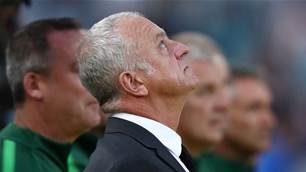Ever found yourself saying you could do better than your team’s coach? FourFourTwo publisher Andy Jackson did... then decided to do something about it by taking the FFA’s C Certificate coaching course.
Tactically and technically.
On first hearing, it's a phrase that makes me chuckle, invoking memories of every Craig Foster analysis where the Socceroos have underperformed.
But look at it a little deeper and you will find these three simple words are the new mantra for Australian football coaching in the 21st century.
Tactics and technique have always been important in our game but never more so since our move into the AFC. With the Socceroos playing as far afield as Tashkent and Tokyo, from monsoons in South East Asia to freezing friendlies in London, the "Two Ts" can be the great leveller in our game. You only need to look at our first Asian Cup group game in 2007 against Oman to see that a tactically and technically organised side can give the favoured team the run around.
The FFA have recognised this and with little fanfare have restructured the coaching education and development pathways in line with the AFC. With tactics and technique front of mind, this coaching "revolution" should help close the gap that was so apparent in games like the ACL Final between Adelaide and Gamba Osaka.
I completed my FA Prelim coaching course in England in 1989 but never took it any further. Injuries blighted any serious chance I had of playing the game at a high level, but I still turn out for my local over-35s in goal. With my work as publisher of FourFourTwo I'm heavily involved at many levels of the game and I found myself thinking more and more about moving into coaching.
You can spend your life being an armchair pundit, spouting clichés about tactics and technique - now was time to do something about it. I was about to take the FFA's two-week residential course for the C Certificate and officially enter the world of top level coaching.
As we all assembled at the AIS for the first time to be greeted by instructors Alistair Edwards and Harry Bingham, there was a distinct "first day at school" vibe, with all 24 of us checking each other out as we made our introductions.
My early trepidation is compounded as I realise I'm by far the least experienced coach on the course, surrounded by a range of ex-NSL players, a former Young Socceroos captain and many people who make a full-time living from the game. We're immediately split into two teams and I'm surprised to find myself co-captain of the "New England Revolution" team alongside Craig Deans, ex-NSL and A-League player and now coach of the Newcastle Jets youth team.
The criteria for passing the course are also explained at this time. There are three practical assessments of which you had to pass two with a mark of 70 percent and two theory exams both of which must be passed with a pass mark of 60 percent.
We're also handed the outline for the two weeks which dispels the notion that this was going to be one of those "turn up and cruise" courses - this is serious. The timetable has 50 sessions of one-and-a-half to two hours each, excluding assessment preparation work, a minimum of three hours a day on the pitch.
Continued on next page...
Related Articles

Backlash over Fox Sports new season launch

W-League, A-League set for world-first equal marketing split












